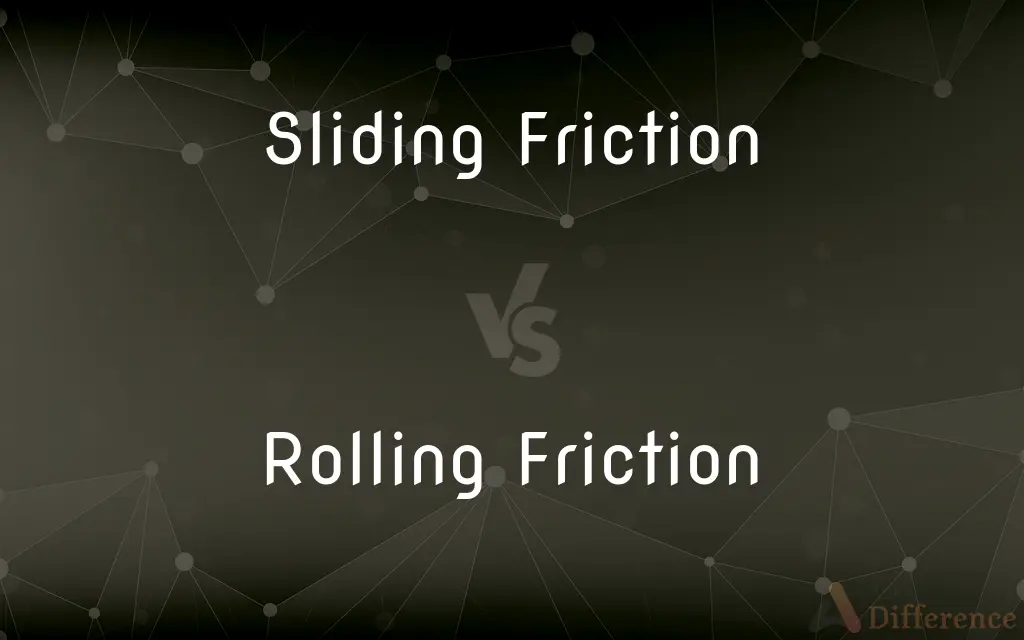Sliding Friction vs. Rolling Friction — What's the Difference?
By Tayyaba Rehman — Published on October 11, 2023
Sliding friction occurs when two surfaces slide against each other. Rolling friction arises when an object rolls over a surface. Both are resistive forces but act differently based on object-surface interaction.

Difference Between Sliding Friction and Rolling Friction
Table of Contents
ADVERTISEMENT
Key Differences
Sliding friction is the force that opposes the motion of two surfaces sliding past one another. It is observable in our daily activities, for instance, when we slide a book across a table. The frictional force acting between the book and the table, resisting the sliding motion, exemplifies sliding friction.
Rolling friction, on the other hand, is the resistive force that opposes the motion of a rolling object over a surface. When a ball rolls across a floor, the friction experienced by the ball which is in contact with the floor, resisting its roll, constitutes rolling friction. Notably, rolling friction is generally less than sliding friction under similar conditions.
When discussing sliding friction, it's essential to recognize that it's determined by two factors: the coefficient of sliding friction and the normal force between the objects. This friction occurs when an object slides across another, and the surfaces in direct contact oppose the motion, offering resistance which is sliding friction.
Rolling friction is significantly influenced by the deformation of the object and the surface over which it rolls. The resistance encountered by a bicycle tire rolling over a path illustrates rolling friction. Here, the tire and the surface slightly deform to create a resistive force, impeding the motion, which is the manifestation of rolling friction.
Comparison Chart
Definition
Resistance to sliding motion
Resistance to rolling motion
ADVERTISEMENT
Dependence
Depends on the normal force and sliding friction
Influenced by deformation and surface contact
Coefficient
Coefficient of sliding friction is typically higher
Coefficient of rolling friction is usually lower
Occurrence
Occurs in sliding objects
Occurs in rolling objects
Examples
Sliding a book, sliding doors
Rolling wheels, rolling ball
Compare with Definitions
Sliding Friction
Hindrance to the movement in direct surface contact.
Sliding objects on ice minimizes sliding friction due to smoothness.
Rolling Friction
Resistance to the motion of a rolling object.
A rolling ball on grass experiences rolling friction.
Sliding Friction
Opposing force to the relative motion in sliding.
Pushing furniture involves overcoming sliding friction.
Rolling Friction
Friction experienced during rotational motion over a surface.
A rolling pin on dough encounters rolling friction.
Sliding Friction
Resistance encountered when an object slides.
Sliding a box creates sliding friction against the floor.
Rolling Friction
Resistive force acting against rolling motion.
Wheels of a moving train experience rolling friction on tracks.
Sliding Friction
Frictional force opposing surface gliding.
A sled experiences sliding friction as it moves down the slope.
Rolling Friction
Force opposing movement in objects rolling over a surface.
Tires on a road encounter rolling friction.
Sliding Friction
Force acting against the motion between sliding surfaces.
Sliding friction is felt when dragging a suitcase.
Rolling Friction
Hindrance in the motion of cylindrical or spherical objects.
Rolling a barrel involves dealing with rolling friction.
Common Curiosities
What factors affect sliding friction?
The coefficient of friction and the normal force primarily affect sliding friction.
What causes sliding friction?
Interaction and resistance between two sliding surfaces cause sliding friction.
How is sliding friction used practically?
Sliding friction is considered in designing brakes, clutches, and sliders.
Is rolling friction typically less than sliding friction?
Yes, rolling friction is generally less than sliding friction under similar conditions.
Does smoother surface always reduce sliding friction?
Typically yes, smoother surfaces usually offer less resistance, reducing sliding friction.
Does weight impact rolling friction?
Yes, greater weight can enhance deformation, influencing rolling friction.
How is sliding friction measured?
It’s measured using the coefficient of sliding friction, multiplied by the normal force.
How does sliding friction differ from static friction?
While both resist motion, sliding friction opposes ongoing motion, while static friction opposes the start of motion.
Does sliding friction increase with speed?
Not necessarily, as sliding friction is largely independent of the relative velocity between surfaces.
Can rolling friction be eliminated?
No, but it can be minimized with optimal material and design choices.
How does tire design relate to rolling friction?
Tire design considers rolling friction to enhance grip and optimize wear.
Does lubrication affect rolling friction?
Yes, lubrication can alter surface deformation and adhesion, impacting rolling friction.
Are sliding and rolling friction relevant in machinery design?
Absolutely, considering these frictions is crucial for optimizing movement and energy usage in machinery.
Can surface materials reduce rolling friction?
Yes, choosing appropriate materials can minimize the rolling friction experienced.
Can rolling friction affect vehicle efficiency?
Yes, lower rolling friction in tires can enhance a vehicle’s fuel efficiency.
Share Your Discovery

Previous Comparison
Marveling vs. Marvelling
Next Comparison
Horizontal Merger vs. Vertical MergerAuthor Spotlight
Written by
Tayyaba RehmanTayyaba Rehman is a distinguished writer, currently serving as a primary contributor to askdifference.com. As a researcher in semantics and etymology, Tayyaba's passion for the complexity of languages and their distinctions has found a perfect home on the platform. Tayyaba delves into the intricacies of language, distinguishing between commonly confused words and phrases, thereby providing clarity for readers worldwide.













































